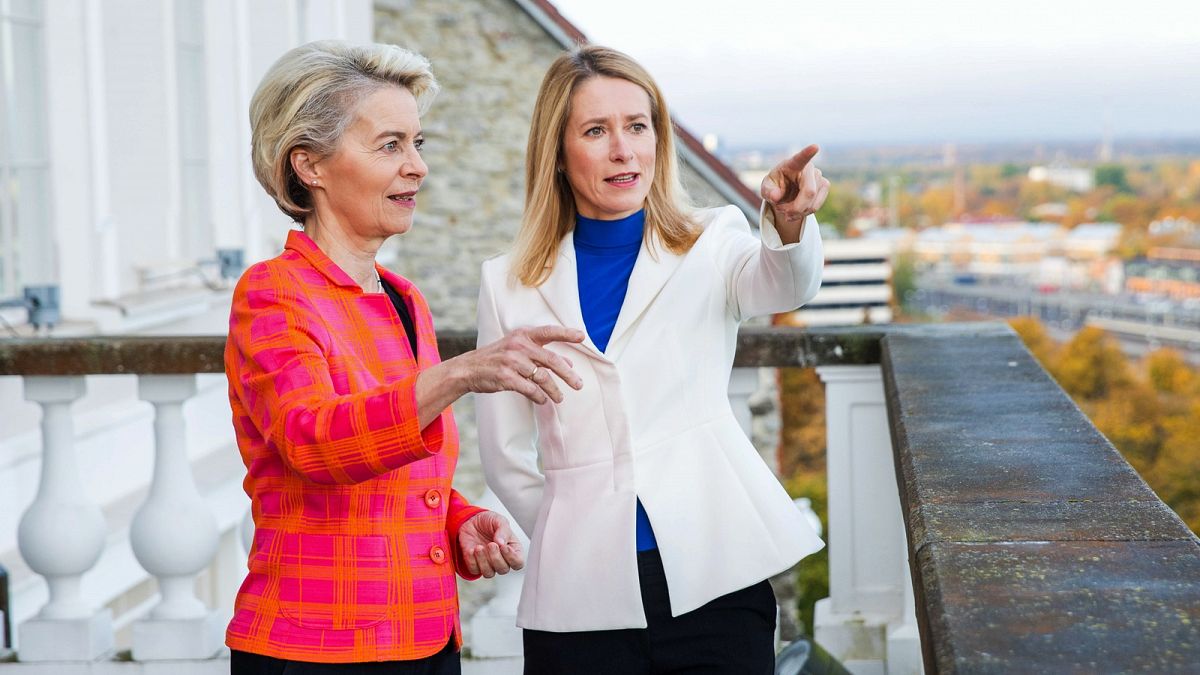Negotiators seal EU top jobs deal for von der Leyen, Costa and Kallas

Despite the reported deal, the decision will not become official until the 27 leaders gather in a summit later this week.
The six European Union leaders acting as negotiators of the main centrist parties have sealed a preliminary deal to allocate the bloc’s top jobs following June’s elections.
The news was first reported by DPA, the German news agency, and was later confirmed to Euronews by diplomatic sources.
The deal follows the previously reported trio of candidates: Ursula von der Leyen for president of the European Commission, António Costa for president of the European Council and Kaja Kallas for High Representative for Foreign Affairs and Security Policy.
The package had already been put together last week during an informal gathering of EU leaders and was given the final go-ahead in a call between Poland’s Donald Tusk, Greece’s Kyriakos Mitsotakis, Germany’s Olaf Scholz, Spain’s Pedro Sánchez, France’s Emmanuel Macron and the Netherlands’ Mark Rutte.
Tusk and Mitsotakis represented the centre-right European People’s Party (EPP); Scholz and Sánchez, the Socialists & Democrats (S&D); and Macron and Rutte, the liberal family of Renew Europe. The three parties are expected to work together and build a durable coalition to sustain von der Leyen’s second term.
“The negotiators of the three political groups have reached a consensus on a common position in accordance with the Treaties,” a diplomat said, confirming the names.
Officials in Brussels were keen on closing the debate in a relatively swift manner due to the volatile geopolitical environment besetting the bloc. The lack of credible alternatives sped up the process, which is essentially a horse-trading game to ensure a political, geographical and gender balance.
The selection of top jobs has to be ratified by all 27 leaders in a crucial summit later this week, during which they will also endorse the Strategic Agenda for the next five years.
Italy’s Giorgia Meloni, Czechia’s Peter Fiala and Hungary’s Viktor Orbán, all of whom are outside the pro-European coalition, have previously complained about the way the top jobs were being negotiated by the three centrist families.
“The deal that the EPP made with the leftists and the liberals runs against everything that the EU was based on. Instead of inclusion, it sows the seeds of division,” Orbán said on Tuesday, doubling down on his grievances.
The decision is made by a qualified majority, meaning national vetoes do not apply. Still, Meloni’s weight in the European Council could be a factor in the face-to-face negotiations on Thursday and drag down the final announcement.
If eventually appointed, von der Leyen and Kallas will still have to undergo a hearing at the European Parliament. Meanwhile, Costa, a former prime minister of Portugal, will be automatically elected by his former peers.
Last week, the EPP took the Socialists by surprise when it demanded to have the presidency of the European Council after Costa completes a term of two years and a half. Euronews understands this demand has now been taken off the table, paving the way for the Portuguese socialist to run the institution for five years.
Costa has become involved in a corruption probe that triggered his resignation last year. While he has not been formally charged, his participation in the irregular deals has not been yet clarified. Costa has adamantly denied any wrongdoing.
Related
A New Book Argues That What Happens in Europe Doesn’t…
Remaking the World: European Distinctiveness and the Transformation of Politics, Culture, and the Economy by Jerrold Seigel “No issue in world
Poland plans military training for every adult male amid growing…
Poland’s prime minister, Donald Tusk, has said his government is working on a plan to prepare large-scale military training for every adult male in response t
2025 European Athletics Indoor Championships: Ditaji Kambundji secures women’s 60m…
Switzerland’s Ditaji Kambundji walked away from the 2025 European Athletics Indoor Championships in Apeldoorn on 7 March with much more than her first Europea
Takeaways from the EU’s landmark security summit after Trump said…
BRUSSELS (AP) — European Union leaders are trumpeting their endorsement of a plan to free up hundreds of billions of








